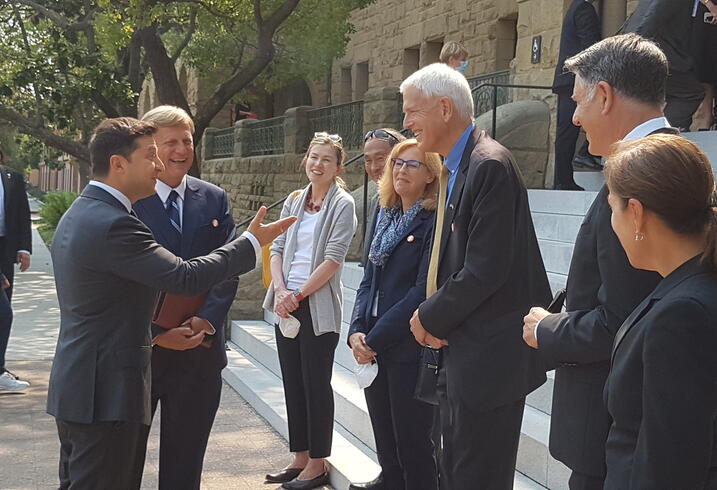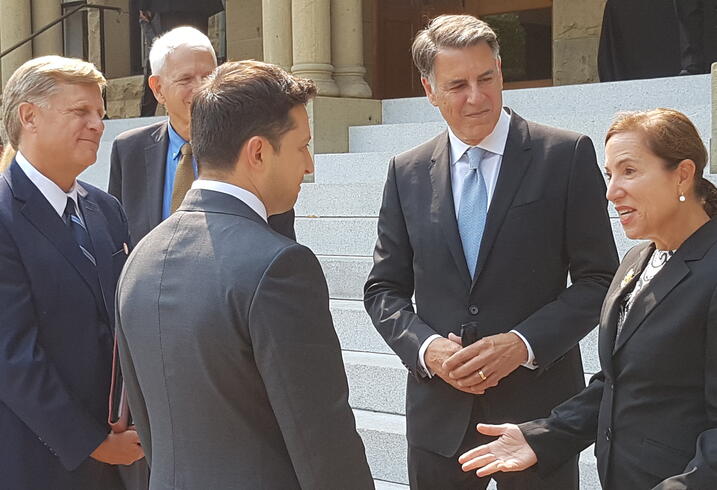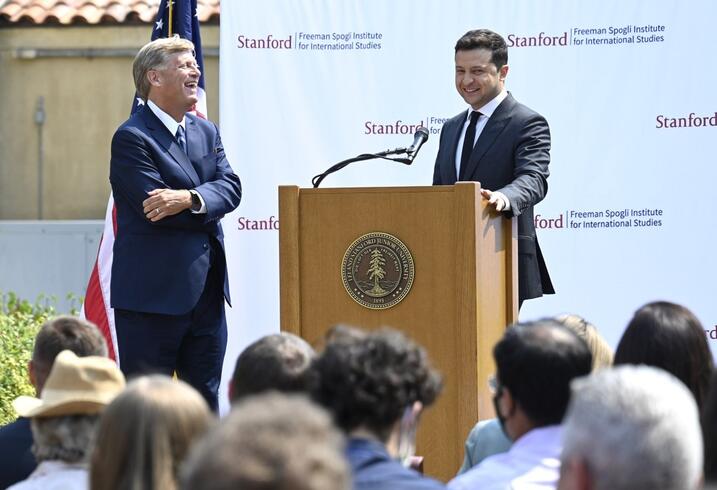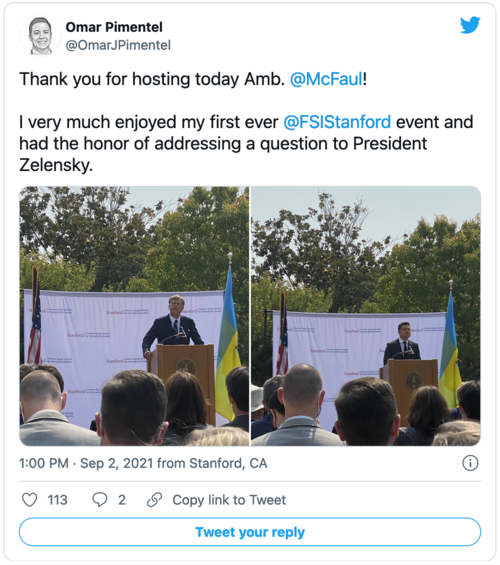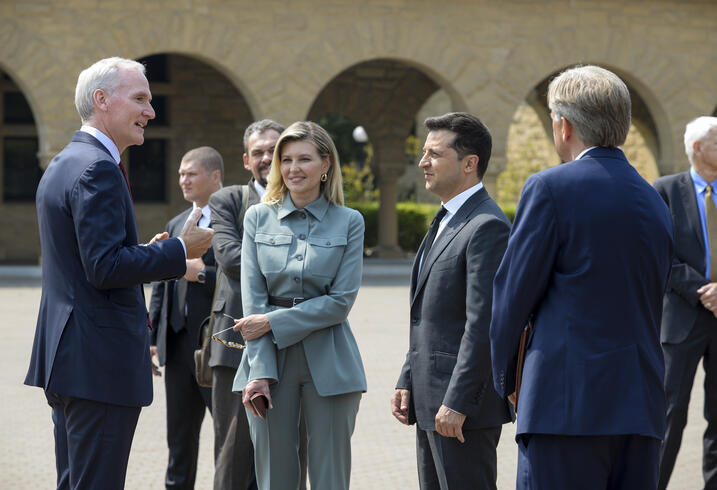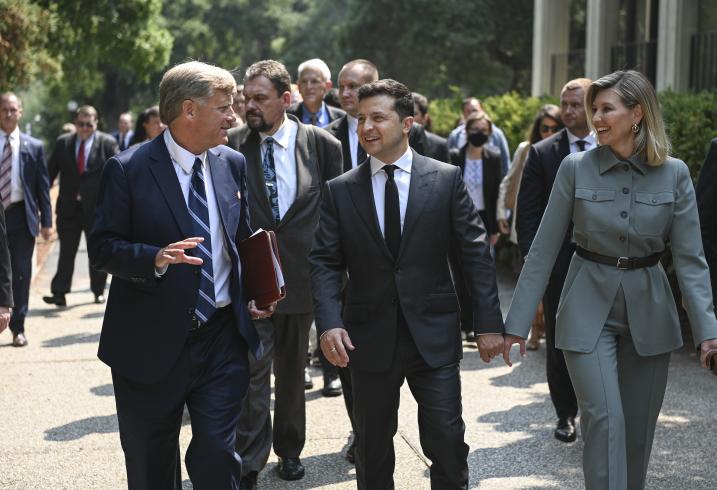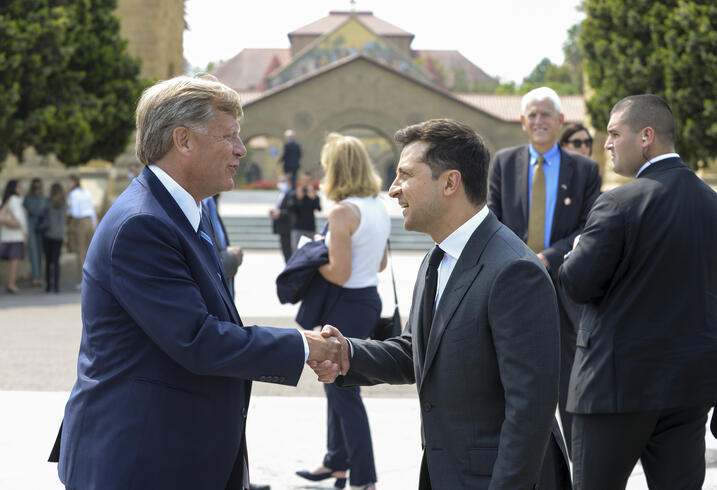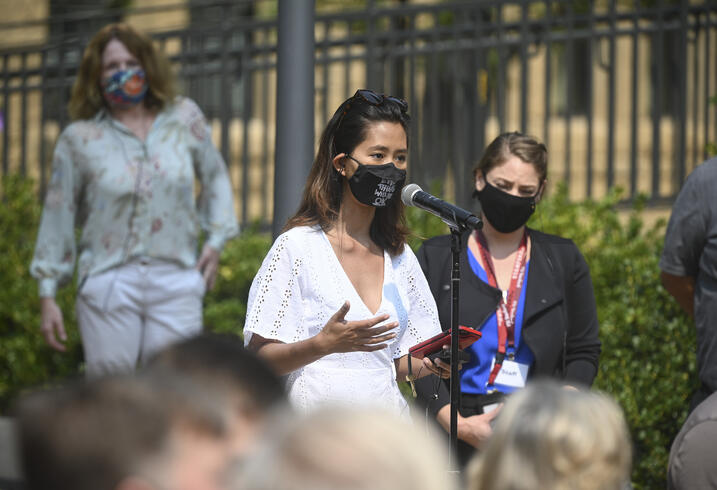NATO Parliamentary Delegation Joins FSI Scholars for Discussion on Ukraine and Russia
Against the backdrop of Ukraine's counteroffensive and the Kremlin's efforts to illegally annex additional territory, a delegation of members from the NATO Parliamentary Assembly arrived at Stanford to meet with experts and weigh considerations about the ongoing conflict. First on their circuit was a panel hosted by the Freeman Spogli Institute for International Studies (FSI) chaired by FSI Director Michael McFaul, with Marshall Burke, Francis Fukuyama, Anna Grzymala-Busse, Scott Sagan, and Kathryn Stoner participating.
The delegates represented thirteen of NATO's thirty member nations, including Belgium, the Czech Republic, France, Greece, Hungary, Italy, Latvia, Luxembourg, Portugal, Romania, Spain, Turkey, and the United Kingdom. Top of mind were questions about the possibility of nuclear escalation from the Kremlin, and appropriate repsonses from the alliance, as well as questions about the longevity of Putin's regime, the nature of international authoritarian alliances, and the future of Ukraine as a European nation.
Drawing from their expertise on state-building, democracy, security issues, nuclear enterprise, and political transitions, the FSI scholars offered a broad analysis of the many factors currently playing out on the geopolitical stage. Abbreviated versions of their responses are given below.

The following commentary has been edited for clarity and length, and does not represent the full extent of the panel’s discussion.
Rethinking Assumptions about Russia and Putin
Kathryn Stoner
Right now, Putin is the most vulnerable he's ever been in 22 years in power. But I don’t believe he's under so much pressure at this point that he is about to leave office anytime soon. Autocracies do not usually die by popular mobilization, unfortunately. More often they end through an elite coup or turnover. And since the end of WWII, the research has shown that about 75% of the time autocracies are typically replaced by another autocracy, or the perpetuation of the same autocracy, just with a different leader. So, if Putin were replaced, you might get a milder form of autocracy in Russia, but I don't think you are suddenly going to create a liberal democracy.
This means that we in the West, and particularly in the U.S., need to think very hard about our strategies and how we are going to manage our relationships with Putin and his allies. This time last year, the U.S. broadcast that we basically wanted Russia to calm down so we could pivot to China. That’s an invitation to not calm down, and I think it was a mistake to transmit that as policy.
We need to pay attention to what Russia has been doing. They are the second biggest purveyor of weapons globally after the United States. They will sell to anyone. They’ve been forgiving loans throughout Sub Saharan Africa from the Soviet period and using that as a way of bargaining for access to natural resources. They’re marketing oil, selling infrastructure, and building railroads. Wherever there is a vacuum, someone will fill it, and that includes Russia every bit as much as China. We need to realize that we are in competition with both Russia and China, and develop our policies and outreach accordingly.

Kathryn Stoner
Confronting Autocracy at Home and Abroad
Anna Grzymala-Busse
Why is Putin in Ukraine? Because the fact that there is a democratic country right next door to Russia is an affront to him. Putin doesn’t care that much about NATO. The fact that nothing happened when Sweden joined is some evidence of this. That’s something to keep in mind as people are debating NATO and Ukraine and Ukraine’s possible future as a member.
NATO membership and EU membership are both wonderful things. But more fundamental that that, this war has to be won first. That’s why I think it’s necessary in the next six months to speed up the support for Ukraine by ensuring there’s a steady stream of armaments, training personnel, and providing other military support.
There’s been incredible unity on Ukraine over the last seven months across the EU, NATO, and amongst our allies. But our recent history with President Trump reminds us how fragile these international commitments can be. In foreign policy, it used to be understood that America stands for liberal democracy. But we had a president of the United States who was more than happy to sidle up to some of the worst autocrats in the world. That’s why we can’t afford to leave rising populism around the world unaddressed and fail to engage with voters. When we do that, we allow far right parties to grab those votes and go unopposed. Whatever happens domestically impacts what happens internationally.

The Consequences of Nuclear Sabre-Rattling
Scott Sagan
We have to very clear-eyed when we’re talking about the threat, however improbable, of the use of a nuclear weapon. When it comes to the deployment of a tactical nuclear weapon, its kinetic effects depend on both the size of the weapon, the yield, and the target. Tactical weapons range in yield from very low — 5-10% of what was in the Hiroshima bomb — to as large as what was used against Hiroshima and Nagasaki. If that kind of weapon was used on an urban target, it would produce widescale effects. In a battlefield or rural area, it would have a relatively small impact.
But in the bigger picture, what any use of a weapon like this does is break a 70+ year tradition of non-use. Those seventy years have been dicey and fragile, but they have held so far. A tradition that is broken creates a precedent, and once there’s a precedent, it makes it much easier for someone to transgress the tradition again. So even if a decision was made to use a tactical weapon with little kinetic importance for strategic effect, I think we still need to be worried about it.
Personalistic dictators surround themselves with yes men. They make lonely decisions by themselves, often filled with vengeance and delusion because no one can tell them otherwise. They don't have the checks and balances. But I want to make one point about a potential coup or overthrow. Putin has done a lot to protect himself against that. But improbable events happen all the time, especially when leaders make really, really bad decisions. That’s not something we should be calling for as official U.S. policy, but it should be our hope.

Cycles of Conflict, Climate Change, and Food Insecurity
Marshall Burke
The estimates right now project that there are 350 million people around the world facing acute food insecurity. That means 350 million people who literally don’t have enough to eat. That’s roughly double what it was pre-COVID. The factors driving that are things like supply chain disruptions from the pandemic and climate shocks, but also because of ongoing conflict happening around the world, Ukraine included.
There was an early concern that the war in Ukraine would be a huge threat to global food security. That largely has not been the case so far, at least directly. Opening the grain corridors through the Black Sea has been crucial to this, and it’s critical that we keep those open and keep the wheat flowing out. Research shows that unrest increases when food prices spike, so it’s important for security everywhere to keep wheat prices down.
What I’m worried about now is natural gas prices. With high global natural gas prices, that means making fertilizer is also very expensive and prices have increased up to 300% relative to a few years ago. If they stay that high, this is going to be a long-term problem we will have to find a way of reckoning with on top of the other effects from climate change already impacting global crop production and the global economy.

Ukraine After the War
Francis Fukuyama
I've been more optimistic about the prospects for Ukraine taking back territory for more of this war, just because of the vast difference in motivation between the two sides and the supply of modern weapons that Ukraine has been getting. But I don’t know what the conditions on the ground will look like when the decision to negotiate comes. Will Russia still be sitting on occupied territory? Are they kicked out entirely? Or are the frontlines close to where they are now?
As I’ve observed, Ukraine's demands have shifted depending on how they perceive the war going on. There was a point earlier this summer where they hinted that a return to the February 23 borderlines would be acceptable. But now with their recent successes, they're saying they want everything back to the 2014 lines. What actually happens will depend on what the military situation looks like next spring, by my guess.
However the war does end, I think Ukraine actually has a big opportunity ahead of them. Putin has unwittingly become the father of a new Ukrainian nation. The stresses of the war have created a very strong sense of national identity in Ukraine that didn’t exist previously. It’s accurate that Ukraine had significant problems with corruption and defective institutions before, but I think there’s going to be a great push to rout that out. Even things like the Azov steel factory being bombed out of existence is probably a good thing in the long run, because Ukraine was far too dependent on 20th-century coal, steel, and heavy industry. Now they have an opportunity to make a break from all of that.
There are going to be challenges, obviously. We’ll have to watch very carefully what Zelenskyy chooses to do with the commanding position he has at the moment, and whether the government will be able to release power back to the people and restore its institutions. But Europe and the West and our allies are going to have a really big role in the reconstruction of Ukraine, and that should be regarded by everyone as a tremendous opportunity.

Victory in Ukraine, Victory for Democracy
Michael McFaul
Nobody likes a loser, and right now, Putin is losing strategically, tactically, and morally. Now, he doesn’t really care about what Biden or NATO or the West think about him. But he does care about what the autocrats think about him, especially Xi Jinping. And with reports coming out of the Shanghai Cooperation Organization that Xi has “concerns” about what’s happening in Ukraine, Putin is feeling that pressure. I think that's why he has decided he needs to double down, not to negotiate, but to try and “win” in some way as defined by him.
In my view, that’s what’s behind the seizure of these four regions. If he feels like he can unequivocally claim them as part of Russia, then maybe he will sue for peace. And that’s exactly what President Zelenskyy fears. Why? Because that’s exactly what happened in 2014. Putin took Crimea, then turned around to the countries of the world and said, “Aren’t we all tired of war? Can’t we just have peace? I’m ready to end the war, as long as you recognize the new borders.” And, let’s be honest, we did.
We keep hearing politicians say we should put pressure for peace negotiations. I challenge any of them to explain their strategy for getting Putin to talk about peace. There is no doubt in my mind that President Zelenskyy would sit down tomorrow to negotiate if there was a real prospect for peace negotiations. But there's also no doubt in my mind right now that Putin has zero interest in peace talks.
Like Dr. Fukuyama, I don’t know how this war will end. But there's nobody inside or outside of Russia that thinks it’s going well. I personally know a lot of people that believe in democracy in Russia. They believe in democracy just as much as you or I. I’ve no doubt of their convictions. But they’re in jail, or in exile today.
If we want to help Russia in the post-Putin world, we have to think about democracy. There’s not a lot we can do to directly help democracy in Russia right now. But we should be doing everything to help democracy in Ukraine. It didn’t happen in 1991. It didn’t happen in 2004. It didn’t happen in 2014. They had those breakthroughs and those revolutionary moments, but we as the democratic world collectively didn’t get it right. This is our moment to get it right, both as a way of helping Ukraine secure its future, and to give inspiration to “small-d” democrats fighting for rights across the world.

Read More

FSI Director Michael McFaul, Kathryn Stoner, Francis Fukuyama, Scott Sagan, Anna Grzymala-Busse, and Marshall Burke answered questions from the parliamentarians on the conflict and its implications for the future of Ukraine, Russia, and the global community.

